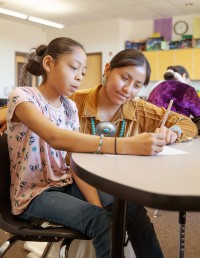NCYL Statement on U.S. Department of Education COVID-19 Guidance
March 17, 2020 – During this unprecedented worldwide COVID-19 pandemic, the National Center for Youth Law (NCYL) continues to advance justice by protecting the rights of children and youth and ensure the public systems impacting their lives provide the supports they need to realize their full potential.
In the face of enormous uncertainty and challenges, we are deeply grateful for the effort many educators and school districts are making to continue educating their students. Such commitment is particularly essential to supporting students with disabilities.
This month, the U.S. Department of Education (ED) issued “Questions and Answers on Providing Services to Children with Disabilities During the Coronavirus Disease 2019 Outbreak” to help education leaders determine how to best serve students with disabilities. While providing useful information regarding some situations, the document indicates that if a school closes to slow or stop the spread of COVID-19 and does not provide any educational services to the general student population, it is not required to provide services to students with disabilities during that same period of time.
This is wrong as a matter of law, and more importantly, deeply harmful to students with disabilities. NCYL urges ED to clarify that a lack of services for extended periods of time for children with disabilities is contrary to the federal statutes, regulations, court decisions and prior ED guidance regarding special education services during extended school closures (e.g., H1N1 flu, Ebola, hurricanes, bankruptcy, etc.). It is incorrect to equate the loss of educational services for students with disabilities to the loss for all students.
The interruption of learning in a classroom hurts everyone, but students with disabilities are particularly vulnerable to losing skills. Without services, these students are likely to fall behind their peers. We strongly encourage state and local education officials to access resources available to help schools determine how to provide those services during closure.
We applaud the commitment and creativity of many state and local education officials in this emergency. We hope that commitment and creativity will extend to supporting students with disabilities, regardless of whether the district is able to continue educating all its students.





